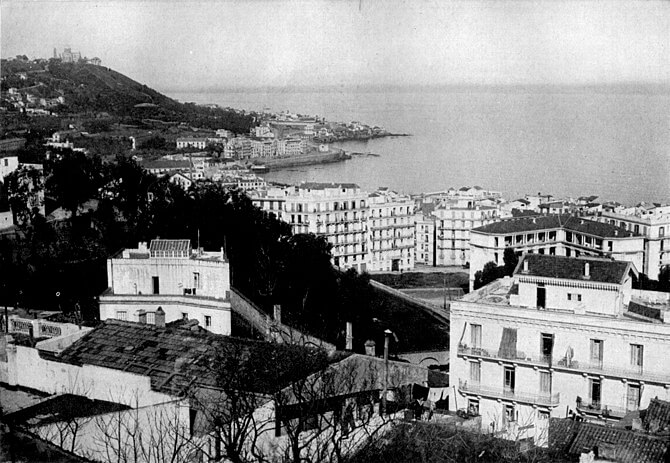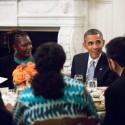Algiers’ African Migrants “Partially Open Door” Policy
Negative discrimination against migrant black Africans might cause political and ethnic complexities for Algiers in the long run
By Abdennour Toumi
Algeria has been an attractive destination for many African migrants since 2008 because of its stability as a government and a country. With in that time, however, a sizable aflux of migrants has grown within the country. Algeria is currently home to around 100,000 migrants, a majority of whom are from southern Sahelian countries, mainly Mali and Niger, according to the Algerian Interior Minister.
Since 2013, the Algerian authorities have expressed concern about migrants settling down in the border cities, the Committee of Coordination has been collecting data and statistics regarding their increasing numbers. Further it has been coordinating with the Malian and the Nigerian governments to set up a repatriation operation for migrants regulated by the local authorities and the Algerian Red Crescent
Algeria is part of the 1951 Convention relating to the Status of Refugees and its 1967 protocol. As a member of the African Union, it is also part of the 1969 A.U. Convention. Despite these international refugee conventions, Algiers has yet to establish a comprehensive national asylum system with UNHCR, rather than the Algerian government undertaking refugee status determination (RSD) under its mandate.
In 2004 Algeria ratified the International Convention for the Protection of Migrants. This convention, however, makes no distinction between legal and illegal migrants. According to a post on the UNHCR website, “they also ratified the Geneva Convention regarding asylum seekers and refugees.
Officially it is estimated that over 4,000 Palestinian refugees live in Algeria, while an additional 111 sub-Saharan African refugees have been recognized by UNHCR in 2009, according to its bureau in Algiers.
Weeks ago, the President’s Chief of Staff and the RND party Chairman, Mr. Ahmed Ouyahia, made a statement contrary to the government’s position and the country’s hospitality approach dealing with the issue of “Africans.” “Recently there has been a large-scale anti-Black African sentiment campaign surfacing in social media demanding the deportation of Africans as a “source of crime and disease,” he said.
To date, Algeria has no clear-cut policies in place to address the rising number of migrants that continue to enter Algeria. Hence anti-Black sentiment is increasing despite the attitude of Algerian officials and the people. For many Algerians, the migrants are becoming too visible, and they are calling them “Africans” using the “k” word (k’hlach) black to describe them.

Women wearing African-style long dresses and headscarves are begging in Algier’s congested cities at stop lights, markets and on Mosques’ sidewalks. Young migrant men are begging on buses, asking passengers for “Muslim” (charity, sadaka with the Sawahli accent).
In response to remarks by the President’s Chief of Staff, Amnesty International made a statement to Mr. Ouyahia and to the people’s anti-Black migrants sentiment: “These people fled war, violence and poverty. They came to Algeria seeking peace and security, and it is our responsibility to welcome them in accordance with international conventions signed and ratified by Algeria.”
Later the newly-appointed Prime Minister, Mr. Abdelmadjid Tebboun, declared that he would seek measures for the benefit of migrant Black-Africans, therefore, their residence would be legalized in Algeria, where the police and gendarmerie services will fully count all displaced persons.
“Each refugee who is present in Algeria, Mr. Tebboun stated, “will be accepted and will have the opportunity to work, while others will have an understanding with their respective governments for repatriation based on government exchange with Mali and Niger, explaining “it is the best way to solve this issue,” he added.
The numbers simply continue to rise and the obstacles to the solution of the crisis remain far out of reach. The country doesn’t have any migrant policy nor the means of assessing the demographic and economic challenges.
However, as an example, Turkey has done an excellent job in hosting and providing protection for Syrians and Iraqis (Yezidis) it has received praise for its efforts by the international community and from the current U.N. Secretary General, former UNHCR Commissioner and the INGOs in Istanbul in June 2015.
The Turkish government is simply offering protection within a legal framework to the Syrian migrants whom it views as “guests”, not fully with refugees status. As such, its programs and policies can serve as a model which Algeria would do well to follow.
If pursued, the Turkish model could work for the Algerian authorities, and these long-term obstacles would be addressed sufficiently to contain the potential fall-out of rising awareness and need for protection. Eventually such policies, if instituted, could provide structure for an integration process for migrants and reduce the risk to social cohesion in southern border cities driven by conflict in Mali and poverty in Niger.
The E.U. for its part, needs to play a more efficient and substantial role in helping Algeria to relieve this enormous financial burden from its shoulders.
In this matter, the Algerian government could adopt several measures including the compulsory registration of all migrants including Black, Syrian and others; there are about 24,000 registered Syrians, according to the Algerian Foreign Citizens Office.
Under the rules of registration the migrants would then have access to free health care and food assistance services provided by local authorities in coordination with Red Crescent, NGOs and INGOs.
Since human rights and INGO organizations have called on the Algerian government to protect migrant rights, these suggestions may be intended to appease those groups whatever the underlying intentions. Even though, human rights protection is desperately needed for the country’s migrants population.
The proposals for protection promised by the government measures will provide legal recourse for migrants to get access to healthcare and social housing, and may help reduce racial tensions in the country, and can work effectively through community initiative projects in coordination with local civilian and military authorities and NGOs.


- Israelisnipers shooting and killing hospital workers in Gaza - December 11, 2023
- CAIR Condemns Israeli Executions of Wounded, Unarmed Palestinian in West Bank - December 11, 2023
- Arab and Muslim American voters face a “simple choice” between Biden’s inhumanity and Trump’s edgy politics - December 9, 2023
























